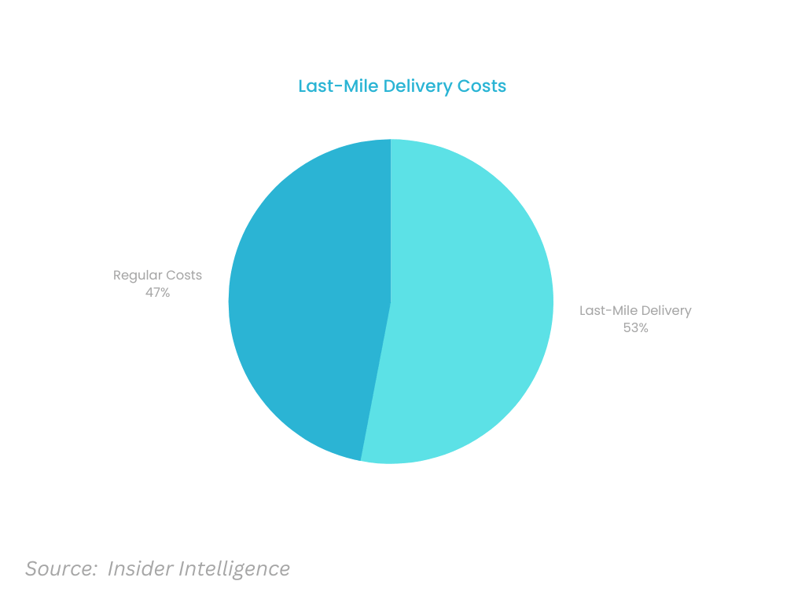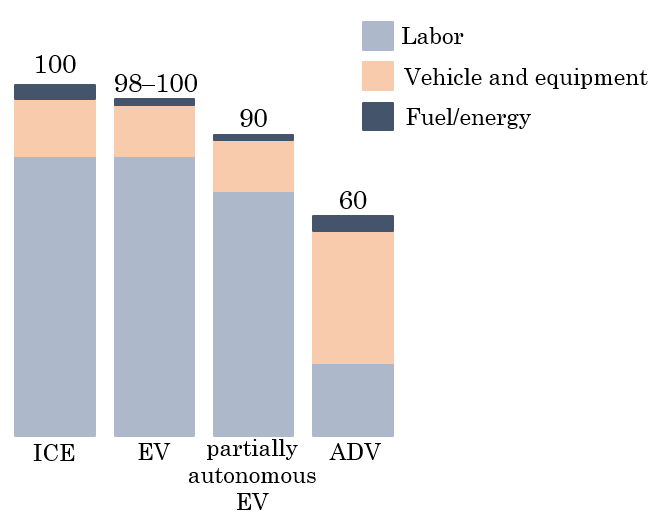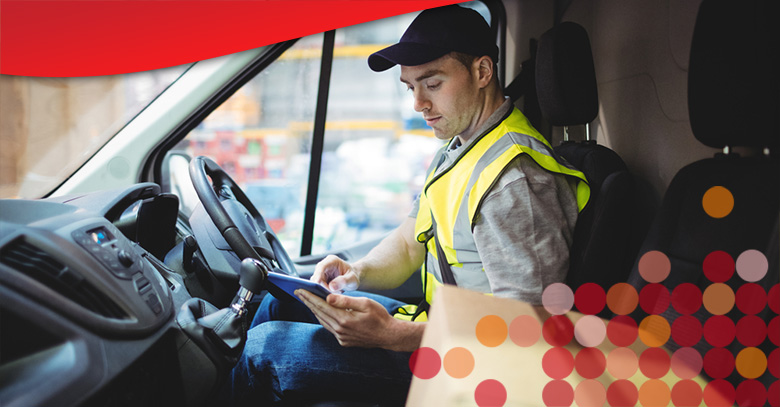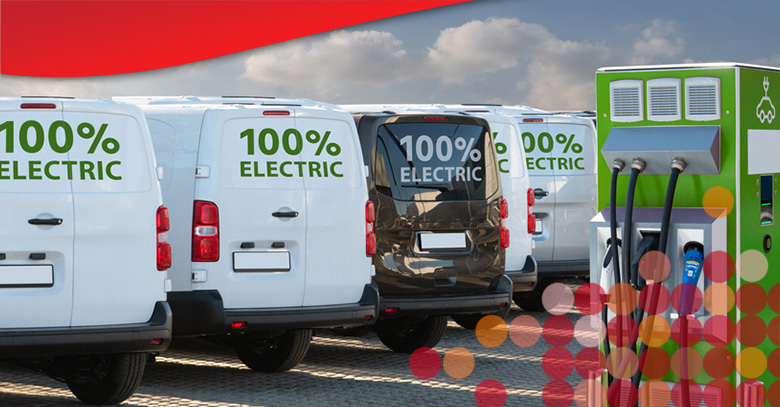Artificial intelligence (AI) has emerged as an essential technology for optimizing and improving last-mile delivery operations. Adopting an innovative AI-powered solution will improve last-mile delivery operations to help enterprise organizations remain competitive and meet changing customer demands.

The Top Last-Mile Delivery Challenges
Last-mile delivery costs’ comprise more than half of an organization's total shipping expenses (over 53%), with a recent study finding that an organization averages $10.10 per package while customers only pay $8.08. This statistic reveals that retailers and logistics companies bear most of these costs, as customers are less likely to pay more for faster delivery options.
A recent study by Bringg of 500 retail managers in the U.S. responsible for supply chain or digital functions found that over 89% of these companies face challenges with their last-mile delivery operations. The top challenges identified in the study include a lack of vehicles and skilled workers and inflexibility during peak seasons, all of which result in lower profitability.
Additionally, survey participants indicated that the complexity of their technology systems, rising delivery costs, and difficulty obtaining real-time visibility after an order is placed are major issues. Managing multiple fulfillment channels with different technologies and relying on manual processes for order planning and dispatching was cited as a major source of inefficiency.
The Common Last-Mile Delivery Costs
When last-mile delivery accounts for more than half of a company's total shipping costs, businesses must find innovative ways to cut costs while ensuring that deliveries meet customer expectations and arrive on time.
The most well-known last-mile delivery expenses revolve around fuel, labor, and vehicle maintenance. Other expenses include packaging and handling, insurance, returns fees, and reverse logistics.
The most common last-mile delivery costs include:
- Labor costs: Hiring and training delivery drivers and paying their salaries and benefits is a significant expense for last-mile delivery companies. Labor costs can account for 50-60% of last-mile delivery costs.
- Fuel costs: Fuel for delivery vehicles is also a significant expense, particularly for businesses that manage a large fleet of vehicles. Fuel expenses account for 10-15% of last-mile delivery costs.
- Vehicle and equipment costs: Vehicle expenses, including mileage and delivery equipment, account for another 10% to 20% of last-mile delivery costs.
- Packaging and handling: For last-mile delivery companies, packaging, handling, and delivery is also an added expense.
- Insurance costs: Another expense is the cost of insurance, such as liability and worker's compensation insurance, to protect the business and its employees.
- Costs of returns and lost packages: The cost of managing returns and lost packages can be high for last-mile delivery companies, which highlights the importance of communication and effort spent to reduce failed deliveries.

Last-Mile Delivery Solutions Q&A
Now that we've looked at the challenges and costs of last-mile delivery let's look at the solutions that can help enterprise companies address inefficiencies in critical areas. Given the importance of technology in transforming last-mile delivery, our solutions will focus on how Tourmo AI can help businesses reevaluate their delivery operations, from behind the scenes to final delivery.
Q: How Can We Reduce Fuel and Labor Costs?
A: Many companies may already know the advantages of AI technology in optimizing delivery routes and schedules to reduce fuel and labor costs. Tourmo's AI-powered platform can determine optimal routing, taking real-time traffic and weather conditions into account while monitoring and training drivers to use safer driving behaviors that increase fuel efficiency.
Tourmo also provides organizations with AI-powered predictive analytics, insights, and visibility, enabling them to accurately forecast demand and optimize staffing levels to maintain the right number of drivers, vehicles, and resources at the right times.
Tourmo's mobility workflow automation features take an organization’s existing transportation and logistics solutions to even higher optimization levels. Tourmo AI can integrate disparate systems while automating many time-consuming tasks associated with manual data analysis and management. This feature can increase workforce utilization, reduce manual overhead, and boost customer satisfaction.
Q: How Can AI Technology Improve Operational Efficiency?
A: Tourmo AI can dramatically improve a mobile workforce's operational efficiency and outcomes, helping it continuously monitor and verify its workforce operations. Additionally, the technology will provide schedule updates and automatically adjust when needed.
Tourmo's AI-powered platform lets organizations keep their employees and customers updated throughout the day to ensure compliance and satisfaction while monitoring deliveries, customer service, orders, and inventory management. This process can reduce costs while increasing last-mile deliveries' speed, accuracy, and efficiency.
Further, because Tourmo provides real-time data analysis and insights while automating time-consuming tasks, it allows supervisors and other company stakeholders to refocus on higher-priority issues, make informed strategic decisions, and effectively manage deliveries.
Q: How Can We Scale Capacity to Meet Demand?
A: Taking advantage of technology's ability to optimize routing and benefit from predictive analytics is one of the most valuable ways AI technology can help organizations scale capacity to meet demand.
Tourmo AI can help optimize routing by determining optimal delivery times and routes and reducing the total amount of time delivery drivers spend on each delivery. Further, an organization can forecast periods of higher demand with AI-powered predictive analytics and plan accordingly.

Tourmo’s AI-Powered Workforce Operations Solution
Artificial intelligence technology is transforming the last-mile delivery process by improving visibility, coordination, communication, and control. Tourmo's AI-powered platform enables enterprise organizations to reduce costs, improve performance, and increase customer satisfaction. If your organization needs to improve its process structure or if you want to implement a more intelligent, efficient, and automated last-mile delivery process, Tourmo will help.
Tourmo's AI-powered Workforce Operations solution tracks and verifies mobile workforce operations around the clock, providing all managers and stakeholders with complete visibility of their mobile fleets. Tourmo automates your entire plan, monitors worker progress, and makes changes as needed. It does all this while continuously updating your mobile workforce and consumers to ensure compliance and satisfaction.
Our Workforce Operations solution will also track whether work is completed as planned, notify clients when something changes, and take action via automated workflows. These features make it easy to identify and manage issues like delays at client sites, unplanned stops, route deviations, and out-of-sequence deliveries, with features that include:
- Accurate event data, normalization, contextualization, and advanced route reasoning to remove inaccuracies.
- Real-time monitoring of job progress and delivery estimates.
- Real-time ETA.
- Automated progress updates.
- Activity and inactivity monitoring.
Overcome Last-Mile Delivery Challenges With Tourmo AI
Customers expect more from their delivery providers, resulting in greater competition and the adoption of cutting-edge technologies that enable last-mile delivery companies to improve their fulfillment processes with greater precision, transparency, safety, and efficiency.
Tourmo can support your company if it is just starting its digital transformation journey or wants to improve its existing last-mile delivery operations. Our solutions upgrade and maximize the ROI of your existing technology investments while improving how you track, verify, and manage your mobile operations.
Author:
Casey is a Solutions Consultant with 20+ years of experience with in-person and virtual presentations, consulting, and sales. Over the last decade, he’s had the privilege of working for three different telematics firms and is extremely familiar with the industry. As a Tourmo Solutions Consultant, he works with commercial accounts on fleet safety, fuel savings, and driving efficiency. Before getting involved in Telematics, Casey spent ten years as a Microsoft consultant and business skills instructor. A Ball State alum, Casey is a family man who enjoys spending his free time helping his wife to raise their wonderful children. He is also a published author, with four novels and 12 novellas in circulation as of this posting.


 Casey Glanders
Casey Glanders



